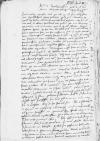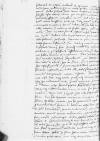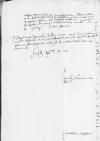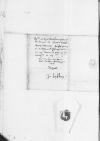Letter #2940
Cornelis DE SCHEPPER to Ioannes DANTISCUSLondon, 1546-03-24
English register:
De Schepper apologises for using a soiled sheet of paper. He had no other paper on hand but did not want to lose the opportunity to write a letter. He summarises his previous letter, sent last winter from London. He was in England on a mission on the Emperor's [Charles V] behalf at the time, soliciting a peace treaty between the Kings of England [Henry VIII] and France [Francis I].
He reports that both Kings sent envoys to the Emperor in November [1545], but no settlement was reached and the war continues. De Schepper has been to London four times in connection with this matter but has achieved little. He complains of the season, not a good one for travel.
De Schepper asks for news. He has long had no letter from Dantiscus and fears for his health.
He reports that the affairs of the Emperor are not threatened. If peace is not achieved in Germany, the Emperor will prove that he is worthy of his office. Many apostates are trying to overthrow the existing order, but Luther, their leader, died recently. De Schepper wishes a similar fate upon all his followers. He fears that Poland will also not stay free of Lutheran influences for long. He expects the summer to be turbulent.
Contrary to earlier fears, the Council of Trent is debating successfully, but has yet to decide whether to deal with dogmatic or moral issues first.
Nothing has changed in De Schepper's private affairs. His wife [Elisabeth Donche], with whom he has a son [Cornelis jr.] and a daughter [Anne], is still alive. De Schepper's stepdaughter [Catharina Laurijn] already has two children. One of his stepsons [Matthias Laurijn], having recovered from wounds incurred during the battle of Kempekoel (in proelio Sittardiensi), accompanied imperial envoy Gerard Veltwijck to Constantinople. Veltwijck left him there ailing and there has been no further news of him. The other stepson is fine.
De Schepper extends greetings to Dantiscus from the imperial envoy in England, Francis van der Dilft.
| received Marienburg (Malbork), 1546-05-09 Manuscript sources:
Auxiliary sources:
Prints:
| ||||||||||||||
Text & apparatus & commentary Plain text Text & commentary Text & apparatus
Reverendissimo et excellentissimo Praesuli et Domino, domino
Zu
Reverendissime et excellentissime Praesul et Domine, domine et pater honorandissime atque ex animo observandissime.
Quia manum agnoscis eius, qui tibi ex animo fuit eritque filius, non excusabo huius chartae sorditiem, quia, cum nuntiarentur
cf.
De te subdubitare coepi, cum me negligentiae oblivionisque nec sine causa accusaris, quod non scripsissem, ne quominus idem feceris aliqua te valetudo adversa impedivisset. Qua sollicitudine ut me exim{i}as, si fieri potest, quantocius effice.
Res
De re domestic[a] mea nihil dico neque accedit quicquam, neque decrescit Deo gratia, estque haec mediocritas mihi quovis augmento fortunae gratior, tantum mihi fructus peperit philosophia experientiaque. Itaque neque cuiquam invideo suam, et mea sum fortuna contentus.
Dominus Deus te cum
Eiusdem Reverendissimae Dominationis Vestrae humilis inservitor et filius
Postscript:
Magnificus dominus
Iterum vale.
[1 ] Cf. cf. David Potter, Henry VIII and Francis I: The Final Conflict, 1540-47, Leiden, Brill, 2011 ⌊POTTER 2011cf. David Potter, Henry VIII and Francis I: The Final Conflict, 1540-47, Leiden, Brill, 2011 ⌋, p. 409-414
[2 ] Luther died on 18 February, 1546
[3 ] ‘Battle at the Kempekoel’ (also written: Kemperkoel, Kempe(r)koul), also known as the ‘Battle of Sittard’ or ‘Battle of the Kollenberg’, 24 March 1543. The troops of Emperor Charles V, commanded by Philippe de Croy, were defeated by the troops of Guelders and Cleves, commanded by Diderik Hoen, Lord of Arcen. Kemperkoel is the toponym of a field near Sittard, a town in the duchy of Jülich (now in the province of Limburg, the Netherlands)



